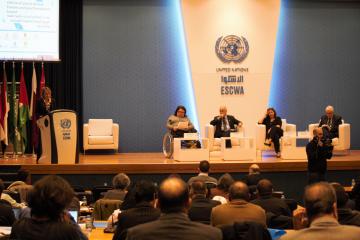
Beirut, 11 January 2019 (Communication and Information Unit)--A score of recommendations was reached today as the Civil Society (CS) wrapped up its two-day forum at the United Nations Economic and Social Commission for Western Asia (ESCWA) headquarters in Beirut. These conclusions will be submitted to the fourth Arab Economic and Social Development Summit (AESD) scheduled later this month in Lebanon, “hoping to build and bolster collaboration between governments and civil society, and provide an independent platform for CS experts to take part in the development process,” organizers said.
The forum was organized by the Arab NGO Network for Development (ANND) in cooperation with ESCWA and members of the Platform on Sustainable Development established in 2018 by a group of civil society networks that include Transparency International (TI), Disabled People International, Arab Chapter (DPI), the Arab Trade Union Confederation (ATUC), Habitat International Coalition, the Arab Women Center for Training and Research (CAWTAR), the Arab Network for Democratic Elections (ANDE), in addition to ANND.
The forum urged the Arab Summit to adopt a new rights-based sustainable development model, shift from consumer to productive economies, and take measures to boost productive options and provide sustainable, decent and inclusive employment opportunities.
Conferees called upon Arab leaders to encourage the League of Arab States (LAS) institutions and member States to reconsider international trade and investment treaties and make sure they take into consideration national economies interests and national development priorities. They also urged governments to vow adopting inclusive social protection systems and stressed the importance of the cultural component in development.
The forum urged the Arab summit to adopt socioeconomic policies that fight inequality through a redistribution of the overall wealth. Currently, the Arab region ranks highest in terms of inequality in wages, with 10% of its population earning 61% of the total income while half of the population earns less than 10% of it, despite the wealth in resources.
In her remarks on behalf of the Platform, the President of the Lebanese Physical Handicapped Union, Ms. Sylvana Lakkis, warned against more lagging in activating partnership between all society components and called upon everyone to avail from the opportunity today to do so, given the urgency raised by the situation in the region.
Participants discussed the role of civil society in monitoring the policymaking process and accountability, in addition to capacity building and implementation of development programmes. They also highlighted the need of different society constituents to participate and agree on clear and binding standards.
Meanwhile, the Middle East and North Africa Policy and Campaigns Manager in Oxfam, Ms. Manal Warde, hoped the meeting leads to laying foundations for an alternative socioeconomic system that civil society organizations seek to reach for the sake of the Arab region.
To this end, lively discussions revolved around a new rights development model; growth, development and sustainability; an inclusive development model that ensures social justice; culture in the framework of the development model; development States; and the role of civil society in development.
The role of ESCWA
In his opening remarks, the Acting Executive Secretary of ESCWA, Mr. Mounir Tabet, highlighted the key role of cooperation between the Regional Commission and Arab civil society organizations in building true partnerships to devise policies aspiring for social justice and equality.
In addition, the Chief of the Social Justice Section in ESCWA, Mr. Oussama Safa, presented on the regional mechanism to enhance participation and revealed that the regional commission has been conducting dialogue since 2013 with these stakeholders to discuss trends and developments in civil partnership and social justice. This evolved into Arab regional forums with CS organizations, in cooperation with ANND, determining the development framework for the post-2015 phase from the civil society perspective.
The upcoming Beirut summit will be the first following the adoption of the Agenda 2030 and its 17 Sustainable Development Goals (SDGs), therefore more commitment and actions are expected from the countries to make. The agenda of the upcoming summit is expected to discuss ways to eradicate poverty, the issue of identity and belonging, ways to combat all forms of violence, and assess the outcomes of wars and conflicts in the region.
Despite the overwhelming challenges, a renowned expert in SDGs Adib Nehme stressed that there is no room for despair, but no room for candid stances either: "We need to be perfectly aware of what we are facing in order to beat injustice and move forward towards development."
For more information:
Nabil Abu-Dargham, Head, ESCWA Communication and Information Unit
+961-70-993-144; email: dargham@un.org
Ms Rania Harb +961-70-008-879; email: harb1@un.org





